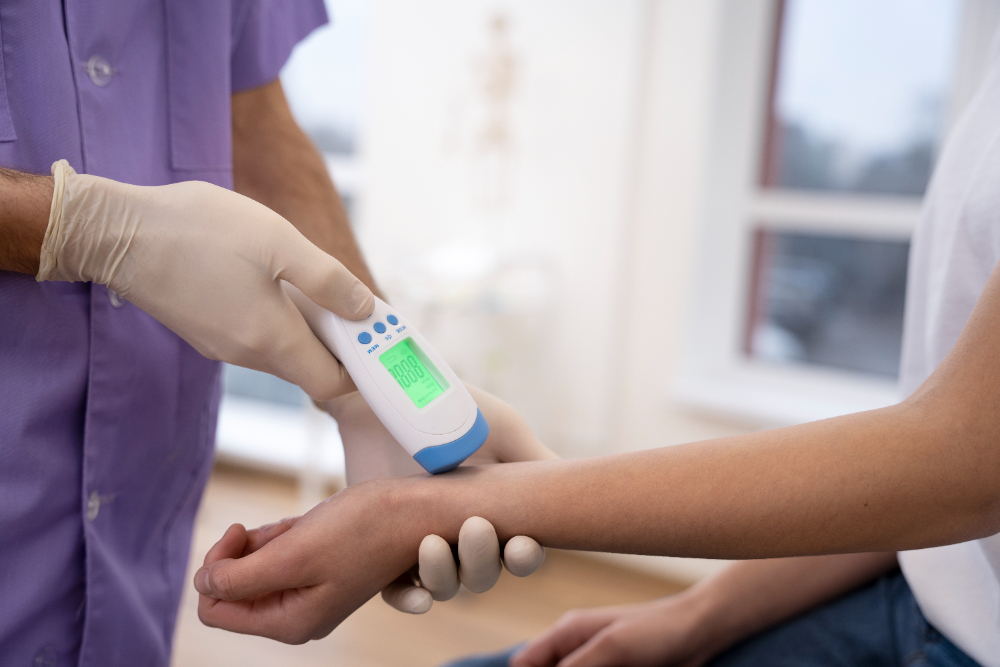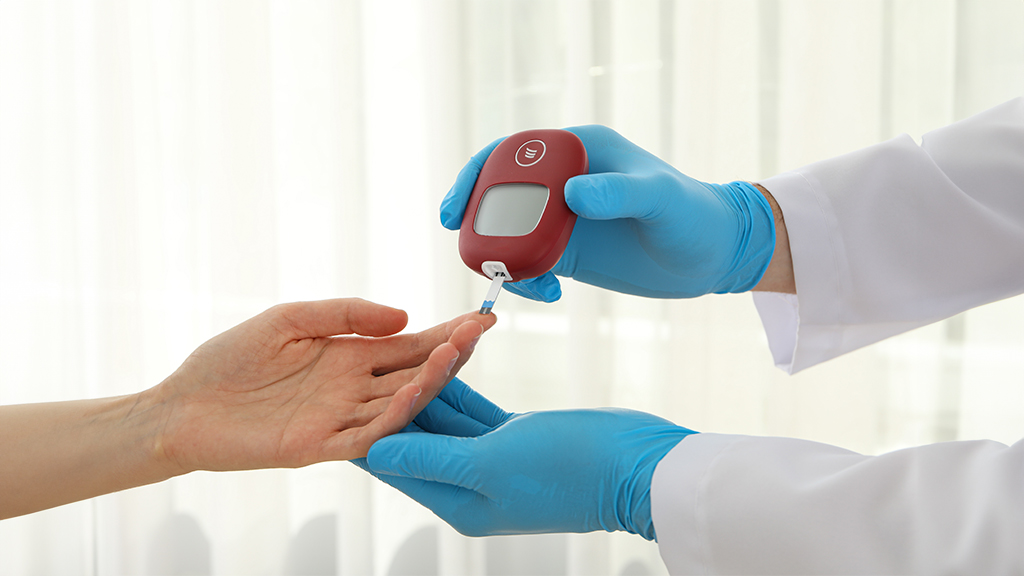
Diabetology

Services Offered

Comprehensive diabetes assessment
A comprehensive diabetes assessment involves a thorough evaluation of an individual’s risk factors, health history, and current health status to diagnose and manage diabetes effectively. This assessment is crucial for determining the type of diabetes (Type 1, Type 2, or gestational) and formulating a personalized treatment plan.
The assessment typically includes a review of medical history, family history of diabetes, lifestyle factors such as diet, exercise, and stress levels, and a series of diagnostic tests. Key tests include blood glucose levels, HbA1c (a measure of long-term blood sugar control), urine analysis, and kidney function tests. Blood pressure, cholesterol, and body mass index (BMI) measurements are also part of the assessment to evaluate overall cardiovascular health, as diabetes can increase the risk of heart disease.
For those already diagnosed with diabetes, the assessment helps monitor disease progression and evaluate treatment effectiveness. Based on the results, a tailored approach may involve dietary recommendations, exercise plans, medication management, and regular monitoring of blood sugar levels to ensure the best possible outcomes. Regular assessments are crucial for preventing complications associated with diabetes, such as neuropathy, retinopathy, and cardiovascular diseases.
Blood sugar monitoring programs

Blood sugar monitoring programs are essential for individuals managing diabetes or pre-diabetes. These programs focus on helping patients monitor their blood glucose levels regularly to maintain optimal control over their condition and prevent complications. Regular blood sugar checks are crucial for assessing how food, exercise, medication, and stress impact blood sugar levels.
These programs often involve personalized education and training on how to use glucose meters, interpret the results, and make adjustments to diet or medication as needed. Patients are taught how to track their readings throughout the day, understanding when and why certain fluctuations occur. The goal is to keep blood sugar levels within a target range to avoid both high (hyperglycemia) and low (hypoglycemia) blood sugar levels.
A typical program includes periodic consultations with healthcare providers to discuss progress, review blood sugar logs, and adjust treatment plans. Additionally, the program may provide support on lifestyle changes, including nutrition and exercise, to enhance blood sugar control. For individuals with diabetes, consistent monitoring is crucial for minimizing the risk of long-term complications, such as kidney damage, nerve problems, and eye issues.
Lifestyle modification counselling
Lifestyle modification counselling is an essential service aimed at helping individuals make positive changes in their daily habits to improve their overall health and manage chronic conditions, such as diabetes, hypertension, obesity, and heart disease. This counselling is personalized to the patient’s specific needs and focuses on areas like diet, physical activity, stress management, and sleep hygiene.

The counselling process involves educating patients about the importance of making healthier choices and setting realistic goals. The counsellor works with the patient to create a tailored plan that includes practical strategies for incorporating more nutritious foods, increasing physical activity, and managing mental well-being. Emphasis is also placed on avoiding harmful habits, such as smoking and excessive alcohol consumption.
By addressing the root causes of unhealthy habits and offering support throughout the process, lifestyle modification counselling helps patients reduce the risk of developing chronic diseases, manage existing conditions, and improve their quality of life. The overall goal is to empower individuals to take control of their health, leading to lasting, positive changes for both body and mind.
Advanced insulin therapies

Advanced insulin therapies are cutting-edge treatment options for managing diabetes, particularly for individuals with type 1 and type 2 diabetes who require insulin to regulate their blood sugar levels. These therapies offer more precise and personalized insulin delivery, allowing for better control over blood sugar and improved quality of life.
Advanced insulin therapies include continuous subcutaneous insulin infusion (CSII) through insulin pumps, which provide a steady and controlled release of insulin throughout the day. Additionally, insulin pens and smart insulin devices offer greater convenience and accuracy in insulin administration, reducing the need for multiple injections and simplifying daily management.
Another key component is the use of insulin analogs—modified versions of natural insulin that have longer-lasting effects or faster action, providing more flexibility in managing blood sugar. These therapies may also be combined with advanced glucose monitoring systems, such as continuous glucose monitors (CGMs), that track real-time blood sugar levels and help adjust insulin dosages accordingly.
By using advanced insulin therapies, individuals can achieve better control over their diabetes, reducing the risk of complications and enhancing overall health and well-being.
Management of Diabetic Foot, Diabetic Retinopathy, and Other Complications
The management of diabetic foot, diabetic retinopathy, and other complications is a crucial part of diabetes care, as uncontrolled blood sugar levels over time can lead to severe health issues. Early detection and proper management of these complications can help prevent further damage and improve overall quality of life.
Diabetic Foot Care involves regular inspection and care of the feet to prevent infections, ulcers, and other complications. Proper wound care, maintaining good hygiene, wearing appropriate footwear, and managing blood sugar levels are essential for preventing serious foot conditions that could lead to amputation.

Other Complications of diabetes include nerve damage (neuropathy), kidney disease, and cardiovascular issues. Effective management of these conditions involves lifestyle modifications, medication adherence, regular monitoring of kidney function and heart health, and addressing nerve-related symptoms to reduce discomfort and improve function.
Diabetic Retinopathy is a condition that affects the eyes and can lead to blindness if left untreated. Regular eye exams, blood sugar control, and timely interventions like laser treatments or injections can help manage the condition and prevent vision loss.
Comprehensive care for these complications ensures that individuals with diabetes can live healthier lives while minimizing the risk of severe outcomes. Regular check-ups with healthcare providers and following a personalized treatment plan are key to successful management.

